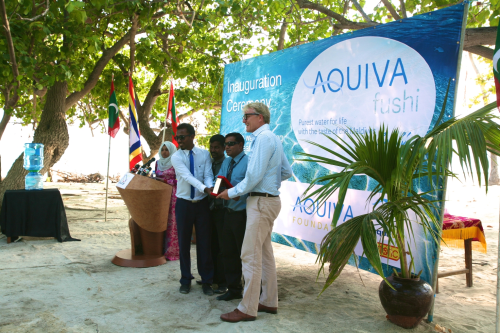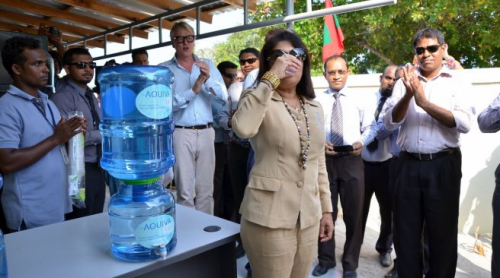

The Maldivian Island of Guhli welcomed the world’s first desalination unit utilising the waste heat of the local power generator to produce up to 10 tons of drinking water per day through membrane distillation.
This week the tap was turned on for a new way of making the energy water nexus work on the small coral Island of Guhli, which measures approximately 600 by 300 metres, and is home to about 1,200 inhabitants.
There are no natural water sources other than seasonal rain, and therefore, Guhli was previously reliant on water imports. The water produced through this new technology will be used to reliably provide water for drinking, cooking and hygienic purposes.
Local power company Stelco developed the project in a joint venture with Aquiva Foundation, which won a tender in 2013 asking to desalinate water utilizing the waste heat available on all Maldivian Islands.
The desalination plant taps into the cooling cycle of local diesel generators to retrieve the thermal heat that is otherwise wasted into the air. This waste heat of about 85 degrees C drives a desalination process under vacuum using the membrane distillation modules of the German/Singaporean company memsys.
This robust process follows, in essence, the natural water cycle and results in distillate water of the highest purity. This distillate is then mineralised using local coral sand for a good Maldivian taste. It is distributed under the brand “AQUIVA fushi” – fushi standing for the pure island taste created by coral sand in the minerallsation process
The water is only available in reusable containers in order to prevent the pollution of the pristine Maldivian nature through the plastic waste of one-way bottles.
“This project shows our efforts to provide environmentally sustainable solutions which improve the conditions for our people using break through technologies,” said the Maldivian Energy Minister Mr. Thoriq Ibrahim.
Florian Bollen, CEO of the Aquiva Foundation, commented: “We say thank you for the joint effort of all parties involved in this project: The Maldivian Authorities, the Guhli Island Council, Stelco providing waste heat and land, our local integrator Static, and our technology suppliers Aquaver and memsys. We believe that this is a good example of how water problems can be solved sustainably on a local level, even in situations where no sweet water is available. We are already working to apply this concept to many of the 200 inhabited islands of the Maldives, plus other nations.”
UN water expert Jehaan Saleem said: “A good supply of safe drinking water has to be on top of the agenda of many small island nations since water-borne diseases are still one of the largest threats to the health of the people on earth.”




